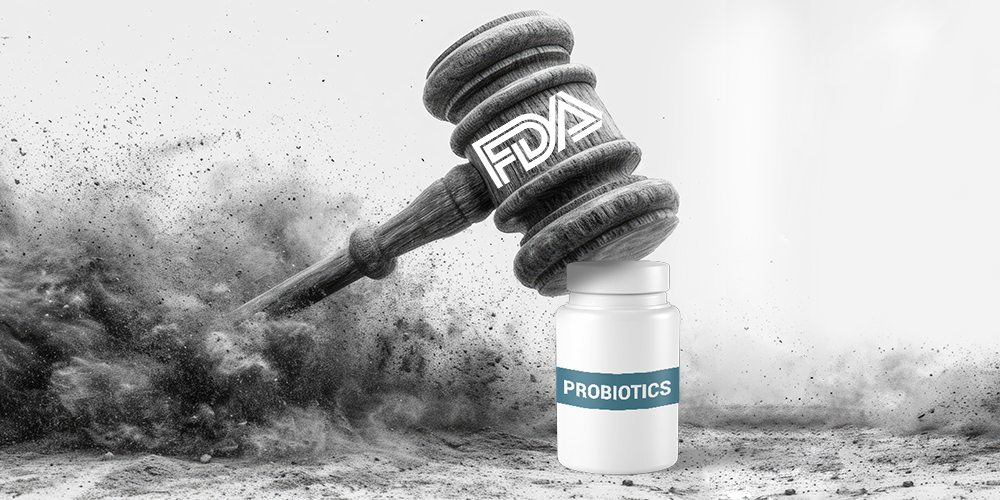FDA rules put the future of probiotic supplements in jeopardy. Action Alert!
Listen to the audio version of this article:
THE TOPLINE
- Probiotics, beneficial microorganisms that support gut health and overall well-being, have gained attention as potent natural medicines. Historical use and recent research highlight their role in improving gut health, mental health, skin health, and potentially reversing obesity.
- The FDA’s New Dietary Ingredient (NDI) guidance could severely restrict the availability and development of probiotic supplements. The guidance’s broad definition of “chemically altered” and the requirement for probiotics to be considered “dietary substances” present significant regulatory hurdles, potentially eliminating many probiotic products from the market and increasing costs for consumers.
In recent years, probiotics have gained significant attention for their potential health benefits, offering a promising alternative to conventional medicine for various conditions. However, the FDA is threatening the future of these beneficial microorganisms with its New Dietary Ingredient (NDI) guidance. This guidance, if fully implemented, could severely restrict the availability and development of probiotic supplements, impacting consumer choice and innovation in the industry. We must continue to push back against this dire policy that is part of a long-term ‘boil the frog slowly’ strategy to make it ever harder for smaller, innovative players to bring advanced, therapeutic supplements to market.
Probiotics 101
While some microbes cause disease, probiotic microbes work by modulating their environment to crowd out unwanted organisms and support the growth of ‘good’ bacteria and other beneficial microorganisms. The use of live microorganisms for health benefits dates back to Neolithic times. Historical records show that as early as the fourth century in China, fecal microbiota transplants were used to combat diarrhea and severe food poisoning. Hippocrates, the ancient Greek physician, famously declared that “death sits in the bowels,” recognizing the importance of gut health long before modern science could explain why.
Fermentation, another ancient practice, was used to preserve food and enhance its health benefits. Traditional fermented foods vary widely across cultures and include items like yogurt, kefir, sauerkraut, kimchi, and miso. The ingredients and methods used in fermentation are diverse, reflecting the rich culinary traditions of different regions.
Recent research has highlighted the extensive health benefits of probiotics, including their potential to reverse obesity, improve gut health, support mental health, enhance skin health, and much more. This because the latest estimates suggest the average human is actually on average only half human: containing roughly the same number of human cells as bacterial cells. Add the other types of microorganisms we find within us and on our skin, we then find human cells are most definitely in a minority in the average human. The bottom line: maintaining microbial diversity is crucial for maintaining a healthy gut, skin, immune system, and brain function, as well as for overall well-being.
The FDA’s one-two punch against probiotics
The FDA’s NDI guidance poses a significant threat to probiotic supplements. If implemented as is, there’s a double whammy against these beneficial products: many probiotic strains of bacteria may not even qualify as supplements according to the FDA’s rules, and those that do will probably be subject to burdensome NDI regulations that could end up eliminating many products from the market.
NDIs are defined as supplement ingredients that entered the market after 1994, when the Dietary Supplement Health and Education Act (DSHEA) was passed. The FDA doesn’t specifically mention probiotics in its guidance, but it does discuss how it will treat “microbial ingredients.” According to the FDA, “microbial ingredients” can only be in supplements if they are “dietary substances.” This means microbes must be used in food before they can be used in supplements. Bacteria used to produce fermented foods like cheese or yogurt would probably qualify.
There are major problems with this. As with most supplements, the methods used to produce probiotics have advanced over the years. Even if a probiotic is using well-characterized microbial strains, new production methods will likely trigger the need for NDI notifications because the FDA might consider these as “chemically altered” probiotics.

Recall that one of the biggest issues with the FDA guidance is the agency’s broad definition of what it means for a supplement to be “chemically altered.” If a supplement has been present in the food supply and has not been chemically altered, it is exempt from submitting an NDI notification. However, the FDA’s definition of “chemically altered” is so broad that only the most basic manufacturing methods would not trigger NDI requirements.
This regulatory framework will negatively impact the research and development of new bacterial strains, such as those that are heat or acid resistant. It will also restrict consumer choice. The costs of submitting an NDI notification to the FDA are substantial because the agency has turned what Congress meant to be a notification process into a de facto preapproval process. This requires extensive studies and a comprehensive dossier for each “new” supplement. Companies often cannot afford this process because supplements are not generally patentable, making it difficult to recoup the costs of complying with these regulations.
Ignoring biological complexity
The FDA’s handling of probiotics demonstrates a lack of understanding of the complex relationship humans have with microorganisms. While ensuring safety is important, the approximately 120,000 species of microbe that have the capacity to act as human pathogens represent just 0.000014% of the estimated species that inhabit our planet. Humans live in concert with microorganisms; they are part of the ecological terrain of our bodies, the maintenance of which is essential to health. It is also wrong to think of particular microbes as inherently pathogenic (“bad”) or beneficial (“good”). Ultimately, how microbes behave in relationship human being is dependent on the terrain (environment) and time in which they find themselves.
Yet, the FDA’s guidance reflects a deliberate attempt to construct an obstacle course for more novel natural treatments that requires provision of safety data before supplements can be marketed to the public. The agency states in the NDI guidance that they “regard all members of a species that contains human pathogens as potentially harmful to human health and, therefore, inappropriate for use as dietary ingredients.”
Given all these restrictions, probiotic supplements will face significant regulatory hurdles. The FDA’s guidance essentially suggests that if a probiotic isn’t an “old” supplement that predates 1994, it either isn’t a supplement or requires an expensive NDI notification. This could limit consumer choice and increase prices for consumers. It appears that this is intentional. Big Pharma is moving into the probiotics sector. Because Big Pharma funds a substantial portion of the FDA’s budget, the agency is helping the drug industry stifle competition from the supplement industry by making it difficult for probiotic supplements to exist.
If we don’t act now, there is a serious risk we will lose a treasure trove of probiotic and even post-biotic supplements that are vital to building whole-body health. This is ever more important as people rely on ever more simplified diets and ultra-processed foods. The very products that are most at risk the ones that give us a fighting chance to combat the rising tide of chronic, degenerative disease.
Action Alert! Write to Congress opposing the NDI guidance. Please send your message immediately.





TRIED TO SEND THE MESSAGE OVER AND OVER AND KEPT GETTING:
One or more errors occured in ActivityScope.Dispose()
PLEASE FIX IT! THANKS.
The FDA’s new dietary ingredient (NDI) notification process threatens access to thousands of dietary supplements. It is critical that the NDI guidance be revised again to reflect what was intended in the Dietary Supplement Health and Education Act of 1994 (DSHEA): to expand, not restrict, consumer access to supplements, and not to turn supplements over to drug companies.
The biggest problem with the guidance is that it takes what is supposed to be a pre-market notification process and morphs it into a pre-market approval process. This is not practical for supplement companies, which cannot recoup the costs of such approvals like pharmaceutical companies can for patentable drugs.
The FDA is also broadening the group of substances that must submit NDIs by adopting a loose definition of what it means for a supplement to be “chemically altered.” If a post-DSHEA ingredient has been present in the food supply and has not been chemically altered, it is exempted from submitting a NDI notification. The problem is that the FDA’s definition of “chemically altered” is so broad that only the most basic manufacturing methods would not “chemically alter” an ingredient. This language will stifle innovation in manufacturing.
The NDI guidance needs to be amended to protect my supplement access and to reflect what Congress intended when it passed DSHEA.